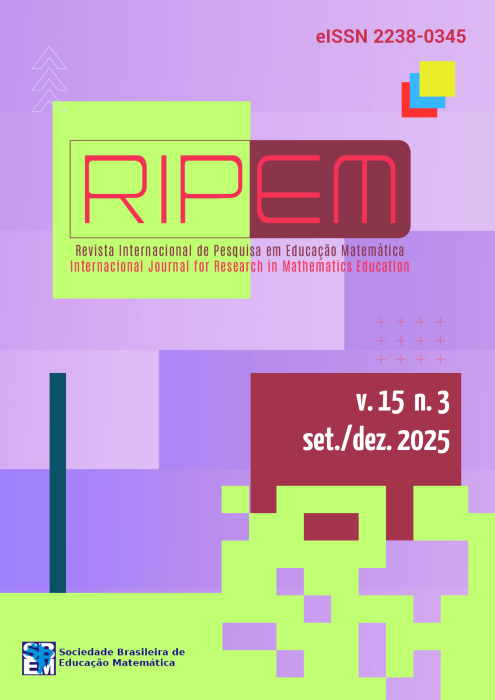Is it Possible to Have School Learning Assessment and Meritocracy Together in the School?
Keywords:
Mathematics Education, Assessment of School Learning, MeritocracyAbstract
This article questions how the assessment of school learning can coexist with meritocracy in a system supposed to ensure equity of opportunities, but that reinforces inequalities in practice. Resistance to new educational approaches is a challenge, and the role of the teacher must go beyond mere knowledge transmission, requiring commitment to the development of citizenship. The "improvement of education quality" must involve real investment in teacher training and teachers’ working conditions and cannot be reduced to quantitative indicators that overlook structural inequalities. School learning assessment is considered both an investigative practice and a learning opportunity. Meritocracy is a concept that may reinforce social inequalities by justifying the unequal distribution of resources and opportunities based on merit. The promotion of social justice in a meritocratic system is complex and often insufficient, as it does not eliminate existing structural inequalities and may even perpetuate them.
Downloads
References
Afonso, A. J. (2007). Estado, políticas educacionais e obsessão avaliativa. Contrapontos, 7(1), 11-22.
Agamben, G. (2009). O que é o contemporâneo? E outros ensaios. Chapecó, SC: Argos.
Alves Filho, M. (2017, 07 de junho). A meritocracia é um mito que alimenta as desigualdades, diz Sidney Chalhoub. Jornal da Unicamp, online.
Arroyo, M. G. (2017). O direito à formação humana como referente da avaliação. In: M. R. L. Sordi, A. Varani & G. S. C. V. Mendes. (Org.). Qualidade(s) da escola pública: reinventando a avaliação como resistência. Uberlandia, MG: Navegando Publicações.
Bloom, B. S. (1956). Taxonomy of educational objectives. Handbook 1: cognitive domain. Ann Arbor: Edward Bros.
Bourdieu, P. & Passeron, J. C. (1992). A reprodução: elementos para uma teoria do sistema de ensino. Rio de Janeiro, RJ: Livraria Francisco Alves Editora S.A.
Buriasco, R. L. C. (1999). Avaliação em matemática: um estudo das respostas de alunos e professores. 238f. Tese (Doutorado em Educação). Universidade Estadual Paulista Júlio de Mesquita Filho. Marília, SP.
Buriasco, R. L. C. (2000). Algumas considerações sobre avaliação educacional. Estudos em Avaliação Educacional, (22), 155-178.
Buriasco, R. L. C. & Soares, M. T. C. (2008). Avaliação de sistemas escolares: da classificação dos alunos à perspectiva de análise de sua produção matemática. In: W. R. Valente. (Org.). Campinas, SP: Papirus.
Buriasco, R. L. C., Ferreira, P. E. A. & Ciani, A. B. (2009). Avaliação como Prática de Investigação (alguns apontamentos). Bolema, 22(33), 69-96.
Díaz Barriga, A. (1999). Uma polêmica em relação ao exame. In: M. T. Esteban. (Org). Avaliação: uma prática em busca de novos sentidos. Petrópolis, RJ: DP&A.
Dubet, F. (2006). La escuela de las oportunidades: ¿Qué es una escuela justa?. Barcelona: Gedisa Editorial.
Esteban, M. T. (2002). A avaliação no processo ensino/aprendizagem: os desafios postos pelas múltiplas faces do cotidiano. Revista Brasileira de Educação, (19), 129-172.
Fernandes, F. (1987). A formação política e o trabalho do professor. In: D. B. Catani, H. T. Miranda, L. C. Menezes & R. Fischmann. (Org.). Universidade, escola e formação de professores. (2. ed.). São Paulo, SP: Editora Brasiliense.
Freire, P. (1996). Pedagogia da autonomia: saberes necessários à prática educativa. São Paulo, SP: Editora Paz e Terra.
Houaiss, A. (2009). Dicionário Houaiss da Língua Portuguesa. CD-ROM.
Lahire, B. (2004). As origens da desigualdade escolar. In: A. Marchesi & C. H. Gil (Org.). Fracasso escolar: uma perspectiva multicultural. Porto Alegre, RS: Artmed.
Latinitium. Dicionário de latim-inglês. https://latinitium.com/
Libâneo, J. C. (2010). Pedagogia e pedagogos, para quê?. (12. ed.). São Paulo, SP: Cortez.
Littler, J. (2013). Meritocracy as Plutocracy: The Marketising of 'Equality' Under Neoliberalism. New Formations, (80-81), 52-72.
Menezes, L. C. (1987). Formar professores: tarefa da universidade. In: D. B. Catani, H. T. Miranda, L. C. Menezes & R. Fischmann. (Org.). Universidade, escola e formação de professores. (2. ed.). São Paulo, SP: Editora Brasiliense.
Morais Filho, D. C. (2016). Um Convite à Matemática. Rio de Janeiro: SBM.
Nóvoa, A. (1999). (Org.). Profissão professor. Porto: Porto Editora.
Nóvoa, A. (2002). Professores: Imagens do Futuro Presente. Lisboa: Educa.
Patto, M. E. S. (2022). A produção do fracasso escolar: histórias de submissão e rebeldia. (5. ed.). São Paulo, SP: Instituto de Psicologia da Universidade de São Paulo.
Perseus Digital Library. Dicionário grego-inglês. https://www.perseus.tufts.edu/
Pinsky, J. (2006). O Brasil tem futuro?. São Paulo: Contexto.
Popkewitz, T. S. (1995). Formação de professores e profissão docente. In: A. Nóvoa. (Org.). Os professores e a sua formação. (3. ed.). Lisboa: Dom Quixote.
Rosa, M., & Orey, D. C. (2019). Reflecting on social justice, and ethnomathematics, and culturally relevant pedagogy in Mathematics Education. Revista Internacional De Pesquisa Em Educação Matemática, 9(1), 94-111.
Scriven, M. (1967). The methodology of evaluation. Indiana: Social Science Education Consortium.
Smith, M. S., Hillen, A. & Heffernan, C. (2001). Student-constructed representations: Vehicles for helping teachers understand students' mathematical thinking. In: 2001 Yearbook of the Pennsylvania council of teachers of mathematics: The role of representation in the teaching and learning of mathematics. State College, PA: The Council of Teachers of mathematics.
Taveira, F. A. L. (2024). Curriculum, Curricular Justice, and Mathematics Education: a political manifesto. Revista Internacional De Pesquisa Em Educação Matemática, 14(2), 1-13. https://doi.org/10.37001/ripem.v14i2.3947
Tyler, R. (1973). Principios básicos del currículo. Buenos Aires: Editorial Troquel.
Valle, I. R. & Ruschel, E. (2009). A meritocracia na política educacional brasileira (1930-2000). Revista Portuguesa de Educação, 2009, 22(1), 179-206
Vianna, H. M. (1997). Avaliação Educacional e o Avaliador. Tese (Doutorado em Educação). Pontifícia Universidade Católica de São Paulo. São Paulo, SP.
Downloads
Published
Issue
Section
License

This work is licensed under a Creative Commons Attribution-NonCommercial-ShareAlike 4.0 International License.



